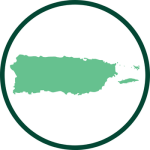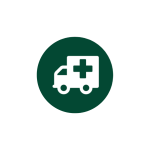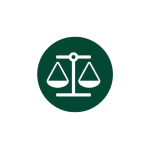Puerto Rico Resources

This page has information specific to this state, including contact information for federal and state agencies, and some key information about laws and consumer protections. Sometimes, state laws are more protective than federal law. For more information on this state's specific laws (e.g., on employment or health insurance), visit Triage Health's Charts of State Laws.
Browse Resources
Advocacy

- For more information on state services, state agencies, and elected officials, you can view the state government website in Spanish or view the state government website in English.
- Information on how to register to vote in this state.
- View state legislative information, including the legislature's daily schedule and information on current legislative bills.
- For additional information and resources related to advocacy, visit Triage Cancer's Advocacy Resources.
Disability Insurance

State Disability Insurance
- For information about your state's short-term disability insurance program, visit the Solicitud de Beneficios por Incapacidad No Ocupacional Temporera website (SINOT)or call 787.754.5353.
Federal Disability Programs
- The Social Security Administration (SSA) administers two disability benefits programs: Social Security Disability Insurance (SSDI) and Supplemental Security Income (SSI). For more information on each program and how to apply, visit the SSA Disability Benefits website.
- Find your local SSA office
- For more information on disability insurance, visit Triage Health's Disability Insurance Resources.
Private Disability Insurance
- You can also purchase short-term and/or long-term disability insurance directly from a private insurance company or this type of insurance may be offered by your employer as an employee benefit. See our Quick Guide to Long-Term Disability Insurance for more information.
Employment

Federal Fair Employment
- The U.S. Equal Opportunity Employment Commission (EEOC) is responsible for enforcing federal laws that make it illegal to discriminate against a job applicant or an employee because of the person's race, color, religion, sex (including pregnancy, transgender status, and sexual orientation), national origin, age (40 or older), disability, or genetic information. The laws apply to all types of work situations, including hiring, firing, promotions, harassment, training, wages, and benefits. For more information about the EEOC, including how to file a complaint, visit the EEOC's website, call 800.669.4000, or email info@eeoc.gov.
- The Job Accommodation Network (JAN) is a program funded by the U.S. Department of Labor, that provides free, expert, and confidential guidance on job accommodations and disability employment issues. They also have several resources on how to approach an employer to request a reasonable accommodation under the Americans with Disabilities Act and a Searchable Online Accommodation Resource where individuals can find suggested accommodations based on job duties or limitations that they are experiencing. For more information, visit the JAN website, call 800.526.7234, or email jan@AskJAN.org.
State Fair Employment
- To learn more about your state's fair employment laws, including information about discrimination in the workplace and how to file a complaint, visit the Departamento del Trabajo y Recursos Humanos de Puerto Rico.
State Unemployment
- Puerto Rico's program is administered by the Departmento del Trabajo y Recursos Humanos, Departamento de Seguro por Desempleo, 787.754.5353.
- There are separate programs for regular work and agricultural work. There is also a program that grants an additional 26 weeks of unemployment compensation to claimants who have worked in establishments where the Secretary of the Department of Labor determines that there is a special situation of unemployment, due to technological changes or the disappearance of an industry or occupation. Additionally, there are specific programs for those who lose jobs due to loss of import trade and those who lose jobs due to a major disaster. The claimant must have a good cause for voluntarily leaving a job.
Vocational Rehabilitation
- Your state's Vocational Rehabilitation agency provides vocational rehabilitation services that are designed to help job seekers with disabilities obtain competitive employment in integrated work settings. For more information on their services, eligibility requirements, and how to apply, visit the Administración de Rehabilitación Vocacional (ARV) website.
More Information
- For more employment resources, visit Triage Health's Employment Topics Page.
Employment - Taking Time Off

Federal Leave Laws
- The U.S. Department of Labor Wage & Hour Division enforces the Family & Medical Leave Act (FMLA) (866.487.9243). The FMLA is a federal law that allows eligible employees to take up to a total of 12 weeks of unpaid, job-protected leave per year under certain circumstances.
Minimum Wage, Vacation, and Sick Leave Act
State Paid Sick Leave (for self)
County & Local Leave
- Some cities and counties may have additional leave laws.
Workplace Leave Policies or Employment Contracts
- Everyone’s situation is different. Check your employee handbook, your workplace policies, and/or your employment contract (if you have one) to see whether you are eligible to take paid or unpaid time off from work.
More Information
- For more information about leave laws in each state, see our chart on taking time off from work.
- For more employment resources, visit Triage Health's Employment Topics Page.
Estate Planning

Finances

For information on financial assistance resources, you can visit our Financial Assistance Resources module. You can then pick from the different categories of financial assistance, to find organizations that may provide financial help to you. Think creatively. For example, if you cannot find anything to help with your medical bills, you may qualify for utility assistance and shift the money you had dedicated to utilities to your medical bills.
- For assistance with managing your finances, including budgeting and dealing with creditors, visit the National Foundation for Credit Counseling.
- Bankruptcy may be an effective way to eliminate medical debt, credit card debt, and/or other types of debt. Learn about filing for bankruptcy visit Triage Health's Quick Guide to Bankruptcy.
- Visit Triage Health's Navigating Finances Resources for more information about ways to manage your finances.
Health

- To find general information about health insurance and other types of insurance offered in your state, as well as to learn more about specific insurance companies, agents, or brokers, visit the Oficina del Comisionado de Seguros.
- For more information and resources on health insurance, visit Triage Health's Health Insurance Resources.
Consumer Assistance
- Puerto Rico Officina de la Procuradora del Paciente, 800.981.0031, info@opp.pr.gov.
Coverage for Children
Visit this site to learn about the El Programa de Seguro Médico para Niños (877.543.7669), that provides low-cost health coverage to children in families that earn too much money to be eligible for Medicaid.
Other Insurance Options
- For more information and resources on health insurance, visit Triage Health's Health Insurance Resources.
- If your health insurance company has denied coverage for your care, you can appeal that decision. The process depends on the type of health insurance that you have.
- If you have private health insurance (e.g., through an employer or the Marketplace), you can also file an external appeal with an entity outside of your insurance company, to see if the insurance company is required to cover your care. The external review process is either handled by the state’s insurance agency or the U.S. Department of Health & Human Services. Visit our Chart of State Laws on Health Insurance Coverage & Navigation to see who runs the external appeals process in your state.
- Medicare is the federal health insurance program for people who are 65 or older, certain younger people with disabilities, and people with End-Stage Renal Disease or ALS. For information about Medicare, to create a personal account where you can view your Medicare information, and to learn about plan options, visit Medicare.gov, or call 800.MEDICARE (800.633.4227)
- Download a copy of Medicare's handbook, “Medicare & You.”
- For help navigating Medicare, contact the State Health Insurance Assistance Program and learn more about Medicare here.
- For more information, visit Triage Health's Medicare Resources.
- Medicaid provides free or low-cost health coverage to eligible individuals, including people with low-incomes, families, children, pregnant women, the elderly, and people with disabilities. Each state has its own rules for eligibility. Read Triage Health's Quick Guide to Medicaid to learn more.
- Visit this site to learn more about Medicaid benefits in your state.
Coverage for Children
- Visit this site to learn about the El Programa de Seguro Médico para Niños (877.543.7669) that provides low-cost health coverage to children in families that earn too much money to be eligible for Medicaid.
More Medicaid Resources
- For more information, visit Triage Health Medicaid Resources.
- For a list of Hill-Burton Federally Funded Health Centers that are obligated to provide free or reduced-cost health care, visit the Health Resources & Services Administration (HRSA) website.
- Federally Qualified Health Centers (FQHC) are community-based health care providers that provide primary care services in underserved areas. To search for an FQHC in your state, use the Find a Health Center tool on the HRSA website.
- To find a community clinic in your area: screenings and services in your area, visit the National Association of Free & Charitable Clinics website.
- The National Breast & Cervical Cancer Treatment Program (NBCCEDP) provides breast and cervical cancer screenings and diagnostic services to women who have low incomes and are uninsured or underinsured. For more information about screenings and services in your area, use the CDC search tool.
Women's Health & Cancer Rights Act (WHCRA)
- WHCRA provides protections for individuals who have had a mastectomy. For more information, visit the Employee Benefits Security Administration website.
Privacy
- HIPAA sets rules about health information privacy. To learn more, read this document on sharing health information with family members and friends.
- For more information about HIPAA and to file a HIPAA complaint, visit the Department of Health & Human Services website.
- To learn about making educated disclosure decisions, visit Triage Health's Quick Guide to Disclosure, Privacy, & Medical Certification Forms.
State Clinical Trials Law
- Some states have a clinical trial law.
More Health Insurance Resources
- For more information and resources on health insurance, visit Triage Health's Health Insurance Resources.
Housing

- For information on state fair housing laws, or if you think you have experienced housing discrimination, visit the Fair Housing & Equal Opportunity website.
- For more information, visit our Financial Assistance Resources module or our Cancer Finances module on Housing Rights & Financial Help.
Legal Assistance

- For more information on ways to find legal assistance and what to consider before choosing a lawyer, read Triage Health's Quick Guide to Legal Assistance.
- If you are having difficulty finding a lawyer in your area, you can use the American Bar Association's Lawyer Referral Directory to search for your state and local bar associations. In some states or counties, these bar associations provide referrals to free or low-cost services for individuals with cancer.
- Lawhelp.org provides a search feature for free legal aid programs, legal information, and legal forms related to your state.
- For information about Medical-Legal Partnership programs in your state, visit the American Bar Association's Medical-Legal Partnership Locator.
- To learn more about Navigating the Legal System, visit Triage Health's Legal Assistance Resources.
Transportation

- Local transit systems may provide free or discounted rates for low-income individuals and families. Some cities also offer bus passes, vouchers for taxi or ride-sharing services, or shuttle services for patients traveling to cancer treatments.
- Dial 211 for assistance.
- For more information on financial assistance resources, visit our Financial Assistance Resources module.
